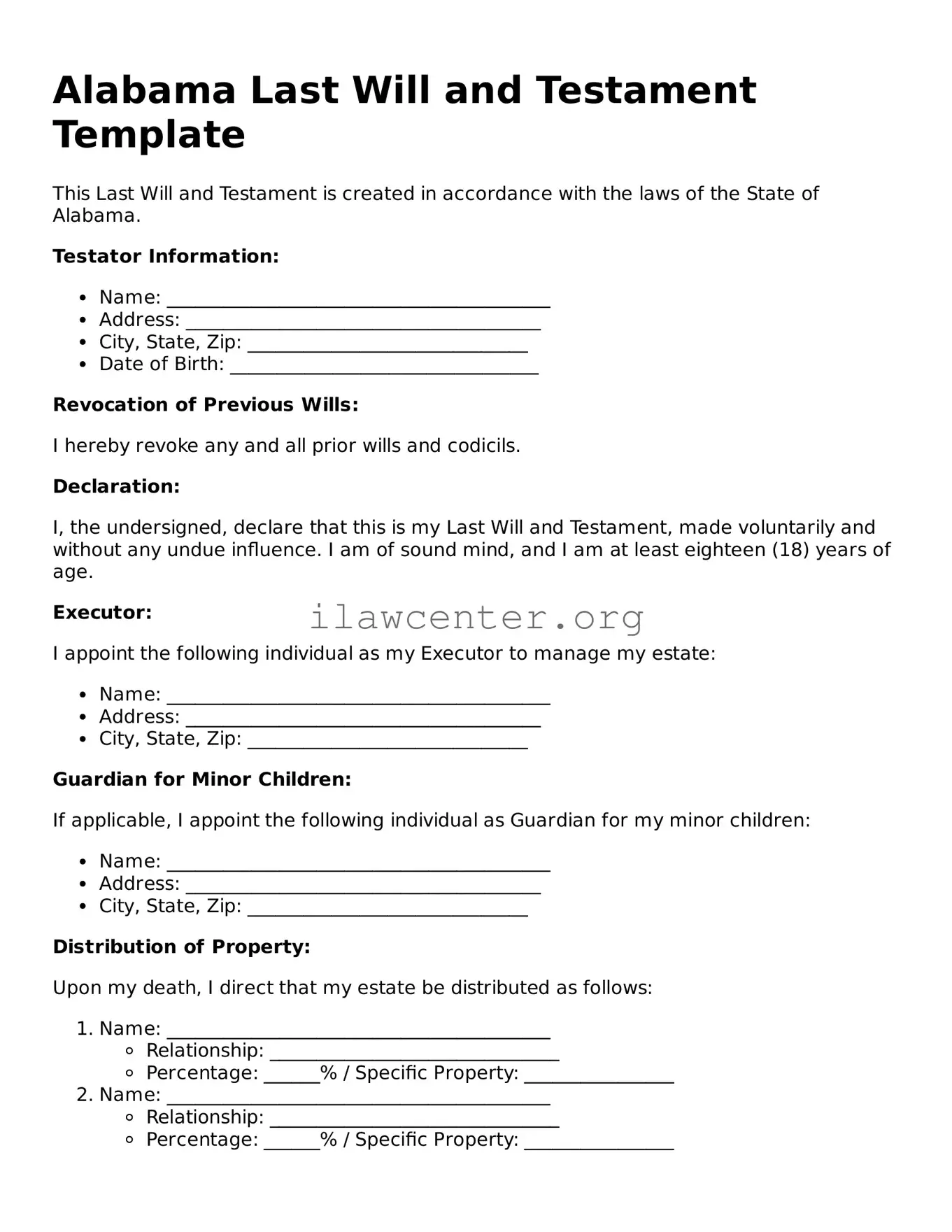What is a Last Will and Testament in Alabama?
A Last Will and Testament is a legal document that outlines how an individual’s assets and responsibilities should be handled after their passing. In Alabama, this document allows you to specify who will receive your property, name guardians for your dependents, and appoint an executor to carry out your wishes. It ensures that your desires are honored and provides clarity to your loved ones during a difficult time.
Who can create a Last Will and Testament in Alabama?
Any adult who is at least 18 years old and of sound mind can create a Last Will and Testament in Alabama. It is important to ensure that the individual understands the contents of the document and the implications of their decisions. This form is available to anyone wanting to establish their final wishes regarding assets, dependents, and other related matters.
Do I need a lawyer to write my Will in Alabama?
While you do not necessarily need a lawyer to create a Last Will and Testament in Alabama, having legal assistance can be beneficial, particularly if your estate is large or complicated. If your situation is straightforward and you feel confident in outlining your wishes, you may choose to complete the Will without legal aid. However, seeking professional help can ensure that your document complies with state laws, reducing the risk of future disputes.
What are the requirements for a valid Will in Alabama?
For a Last Will and Testament to be considered valid in Alabama, it must meet several criteria. The document must be written, signed by the testator (the individual creating the Will), and witnessed by at least two individuals. These witnesses must sign the Will in the presence of the testator. It is also advisable to ensure that the Will remains stored in a safe place where it can be easily accessed after your passing.
Can I change or revoke my Will in Alabama?
Yes, you can change or revoke your Last Will and Testament at any time while you are still alive, provided you have the capacity to do so. If you wish to make changes, these can typically be made through a codicil, which serves as an amendment to the original Will. Alternatively, you may choose to create an entirely new Will, which should clearly state that it revokes any previous Wills. Always ensure that any updates meet the legal requirements.
What happens if I die without a Will in Alabama?
If you pass away without a Last Will and Testament, your estate will be distributed according to Alabama’s intestacy laws. This means that your assets will be allocated based on a predetermined hierarchy, which may not align with your wishes. Additionally, without a Will, the court will appoint an administrator to handle your estate, which can lead to delays and additional costs for your loved ones.
How can I ensure my Will is executed properly?
To ensure that your Last Will and Testament is executed according to your wishes, it is crucial to choose a trustworthy executor. This individual will be responsible for managing your estate and ensuring that your directives are followed. Also, keep open lines of communication with your family about your wishes and the location of your Will. Regular reviews and updates to your Will can further help avoid confusion and legal complications in the future.
Are there any specific considerations if I have minor children?
If you have minor children, it is essential to address their care in your Last Will and Testament. You can designate a guardian who will be responsible for their welfare in the event of your passing. Choosing a guardian is a significant responsibility, so consider carefully who would provide the best environment for your children. Discuss these decisions with potential guardians in advance to ensure their willingness to take on this important role.
